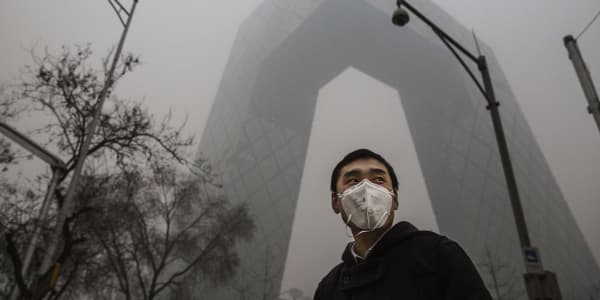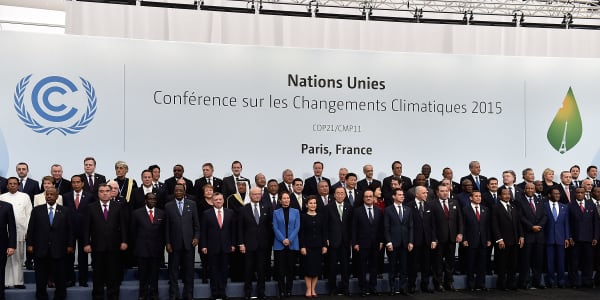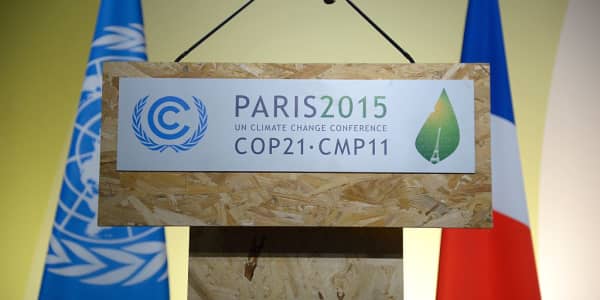At a joint news conference here Tuesday with President François Hollande of France, President Obama veered from his focus on the terrorist attacks in Paris to bring up the huge international gathering beginning in the French capital on Monday to hammer out a global response to climate change.
"What a powerful rebuke to the terrorists it will be when the world stands as one and shows that we will not be deterred from building a better future for our children," Mr. Obama said of the climate conference.
The segue brought mockery, even castigation, from the political right, but it was a reminder of the importance Mr. Obama places on climate change in shaping his legacy. During his 2012 re-election campaign, he barely mentioned global warming, but the issue has become a hallmark of his second term.
And on Sunday night he arrives in Paris, hoping to make climate policy the signature environmental achievement of his, and perhaps any, presidency.
"He comes to Paris with a moral authority that no other president has had on the issue of climate change," said Douglas Brinkley, a presidential historian at Rice University who noted that Mr. Obama's domestic climate efforts already stand alone in American history. "No other president has had a climate change policy. It makes him unique."
In Paris, Mr. Obama will join more than 120 world leaders to kick off two weeks of negotiations aimed at forging a new climate change accord that would, for the first time, commit almost every country on Earth to lowering its greenhouse gas pollution. All year, Mr. Obama's negotiators have worked behind the scenes to fashion a Paris deal.
Crucial to Mr. Obama's leverage has been the release of his domestic climate change regulations, which he then pushed other countries to emulate. So far, at least 170 countries have put forth emission reduction plans.
But even as Mr. Obama presses for a deal in Paris, it faces steep obstacles, not least the legal and legislative assault on his own regulations at home. During the course of the Paris talks, Republicans in Congress are planning a series of votes to fight Mr. Obama's climate agenda. More than half the states are suing the administration on the legality of his climate plan. And all the Republican presidential candidates have said that they would undo the regulations if elected.
On Nov. 19, Senator James M. Inhofe, Republican of Oklahoma, chairman of the environment committee and the Senate's most vocal skeptic on climate change science, and Senator John Barrasso of Wyoming sent a letter to Mr. Obama, signed by 35 other senators, promising to block the funding for any climate deal unless the Paris pact is sent to Congress for ratification. A vote on the deal would fail in the Republican-controlled Congress.
"Our constituents are worried that the pledges you are committing the United States to will strengthen foreign economies at the expense of American workers," the senators wrote. "They are also skeptical about sending billions of their hard-earned dollars to government officials from developing nations."
Nonetheless, Mr. Obama is pushing forward. He unveiled the rules on curbing heat-trapping greenhouse gas emissions with a tight timeline, ensuring that they would be finalized before he leaves office. He has raised the issue of climate change in dozens of speeches and with every recent visiting foreign leader. In Washington, a team of environmental lawyers is preparing to defend the rules in court, while at the State Department, climate envoys are in constant contact with their counterparts around the world.
If his domestic regulations and a Paris accord withstand efforts to gut them, "climate change will become the heart and soul of his presidency," Mr. Brinkley said.
Mr. Obama is an improbable environmental champion. Unlike former Vice President Al Gore, fighting climate change was never the driving force of Mr. Obama's political career.
More from the New York Times:
- The Pacific ocean becomes a caldron
- Greenland is melting away
- Limited progress seen as nations step up on climate
As a senator and a presidential candidate in 2008, Mr. Obama checked off the standard slate of progressive environmental policies, including a cap-and-trade program to combat carbon emissions and expanded subsidies for renewable energy. He promoted the creation of green jobs. And on the final Democratic primary night of 2008, he predicted that future generations might see that "this was the moment when the rise of the oceans began to slow and our planet began to heal."
But in his first term, Mr. Obama invested most of his political capital in his signature health care law. He also prioritized the economic stimulus law and a Wall Street regulatory package — issues that resonated with voters during the recession.
While Mr. Obama supported a bill pushed by congressional Democrats to cap greenhouse gas emissions and force industries to pay for permits to pollute, its failure in 2010 appeared to make little impression on him. Environmentalists complained that Mr. Obama had done little to promote the measure as it languished in the Senate.
Mr. Obama did enact some environmental policies in his first term, including $80 billion for clean-energy projects and rules curtailing tailpipe emissions.
Yet during the 2012 campaign, advisers urged him not to talk about climate change. "It didn't poll well," said David Axelrod, Mr. Obama's chief strategist in 2008 and 2012.
The candidate cared about the issue, Mr. Axelrod said, but voters cared more about the economy. "He felt bridled in his ability to talk about it," Mr. Axelrod said. "It was no secret to anyone that this was an issue of continuing and big concern to him. But the reality is that you can't do anything about climate change if you lose an election."
In his second inaugural address, Mr. Obama surprised many on his staff when he made new climate policy one of the most prominent promises of the speech. That set off an aggressive campaign to use his executive powers to sidestep congressional opposition.
"That inaugural address was the turning point," said Heather Zichal, Mr. Obama's former top climate change adviser. "That was his expectation, and we had to deliver."
Follow us on Twitter: @CNBCWorld






